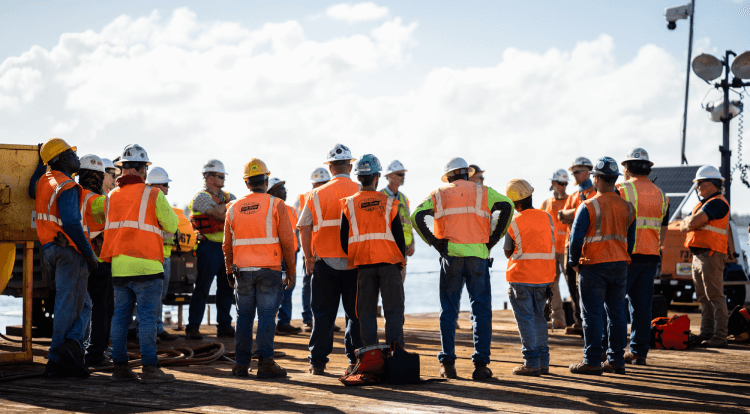Why Blue-Collar Work Matters
Written by Jocko Willink
February 9, 2023
As a society, we've moved away from the trades. Instead of building and making things, we value knowledge-based industries like finance and tech.
"But it's still a built world," says BuildWitt CEO Aaron Witt. "We still use things that exist physically that need to be made somehow."
Blue-collar work is as important today as it’s always been, if not more. The trades are crucial to America's long-term success, and they are going to stick around for the long-haul.
So, the trades are a worthy career choice. Leadership expert Jocko Willink explains why going into the trades is a smart move.
The built world is the backbone of America
Construction isn’t trendy or sexy. It doesn’t dominate the headlines like the tech and finance industries do.
But as Jocko points out, "The construction industry is building stuff all the time and has been. Without building, without construction, there would be no finance. People need homes to live in. Companies need buildings to operate out of. This is what America is."
In other words, there's just no way to avoid blue-collar work. (Whew—thank goodness!)
Jocko, a former Navy SEAL, says, "It's sort of like being a soldier, right? Look, you can make a bunch of technology, you can come up with some great plans, and you can try to make peace. But at the end of the day, somebody's got to know how to shoot a machine gun."
Construction is the same way. Jocko explains, "You can amke some great technology that can ease some of the aspects of building. But at the end of the day, people—human beings—have to go out there and build.”
The trades are the backbone of America. "I worked construction when I was a kid and love it. When I look at a completed building, I understand what's gone into that process and the skills and capabilities that it takes to get there. That's why I love working with construction companies," Jocko says.
A career in the trades is meaningful
As the Dirt World's workforce shortage worsens, young people are entering other industries without giving the blue-collar world a second thought.
But Jocko says there’s a reckoning happening.
"I think the world speaks for itself right now. There's a lot of people out there getting degrees in a bunch of topics that don't really serve any purpose, and there's a reckoning happening with that right now in America," he observes.
Jocko continues, "People spent $200,000 getting a degree, and they have $200,000 in debt, and they get a job where they get $34,000 a year based on that degree. I think the world sees that. I think they see it in America.”
What’s worse is that the degrees themselves don’t provide any benefit to the world.
Jocko explains, "There's no skill there. It's something you could have learned in the library reading books. Which it's admirable to read books and learn things. But if you go into the blue-collar industries—you become an electrician, a plumber, a carpenter, an ironworker, you pour concrete—that's a skill that you are going to bring to bear in the world."
Those skills are going to serve you and serve society, and Jocko believes young people are starting to pursue that.
Jocko has four kids, so he spends a lot of time with young people. He sees a lot of them realizing that a four-year degree in a subject that's hard to pin down, that doesn't fluidly interact with the world, is meaningless.
"There's a lot of young people now who are seeing that they can have a meaningful life and a meaningful career and bring something meaningful to the world through any one of the trades," says Jocko.
The trades offer unlimited potential to lead
Jocko started as an 18-year-old laborer in construction, and he enlisted in the SEALs—which he's quick to point out is another blue-collar job. Since then, he's become a world-renowned leadership expert, speaker, best-selling author, and business owner.
The point is, where you start in blue-collar work isn't necessarily where you end up.
Jocko says, “I have a friend of mine. Dad was an electrician, he became an electrician. And he's a smart guy, hard-working guy. I don't know how many years it was, but it wasn't many before he had three other electricians working for him. And I don't know how many years after that before he had. Now, he’s an electrician, sure. But he’s not pulling wire every day. He’s running businesses.”
From that perspective, Jocko says there isn't a better place to start your career than "going out and learning a trade and coming up through the ranks."
He also points out that there's unlimited opportunity in the Dirt World—especially for young people who want to become leaders.
"If you learn how to lead, that's where you win. If that's what you're looking to do. If you want to end up in a leadership position, and you actually put effort into learning how to lead, you will end up in charge. You have unlimited potential," he says.
Getting started in blue-collar work
Blue-collar work is just as important as ever, and the trades continue to form the backbone of America. After all, without people building things, where would we be?
And as Jocko points out, many young people are coming to the same conclusion. They want to learn a skill and bring meaning to the world through a career in the trades. They're also starting to see the unlimited potential to become leaders in the Dirt World.
But if that's you, how do you break into the trades?
The best way is to start learning about the different career options and trade industries that are available to you, like the ones in the Dirt World.













